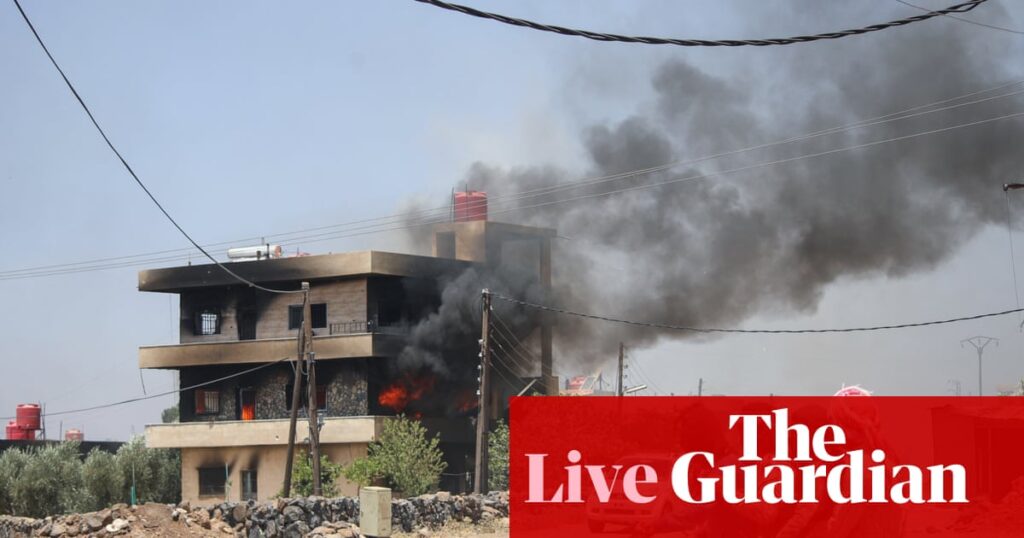‘Tense calm’ reported in Sweida after withdrawal of Bedouin fighters
The Reuters news agency has spoken to residents who say there is a “tense calm” in Sweida after the Islamist-led government declared that Bedouin fighters had withdrawn from the predominantly Druze city.
Kenan Azzam, a dentist, told Reuters residents were still, however, struggling with a lack of water and electricity.
“The hospitals are a disaster and out of service, and there are still so many dead and wounded,” he said by phone.
Syrian government troops are amassed at a security checkpoint outside of Swedia city, preventing factional fighters from entering.
Key events
US special envoy says Syria ‘stands at a critical juncture’
US special envoy to Syria Tom Barrack said this morning that Syria stood at a “critical juncture”, adding that “peace and dialogue must prevail – and prevail now”.
In a post on X, he wrote:
President Trump’s decision to lift sanctions was a principled step, offering the Syrian people a chance to move beyond years of unimaginable suffering and atrocities.
The international community has largely rallied behind the nascent Syrian government, watching with cautious optimism as it seeks to transition from a legacy of pain to a future of hope.
Yet, this fragile ambition is now overshadowed by profound shock, as brutal acts by warring factions on the ground undermine the government’s authority and disrupt any semblance of order.
All factions must immediately lay down their arms, cease hostilities, and abandon cycles of tribal vengeance. Syria stands at a critical juncture – peace and dialogue must prevail – and prevail now.
His comments came a day after the US secretary of state, Marco Rubio, urged the Syrian government’s security forces to prevent jihadists from entering and “carrying out massacres” in the south, and called on Damascus to “bring to justice anyone guilty of atrocities including those in their own ranks”.
The government is headed by Syrian president Ahmed al-Sharaa. He is the former leader of Hayat Tahrir al-Sham (HTS), the Islamist rebel group which led the military operation to topple the former president of Syria, Bashar al-Assad, in December.
Witnesses, Druze factions and the Syrian Observatory for Human Rights have accused government forces of siding with the Bedouin and committing abuses, including summary executions, when they entered Sweida earlier in the week.
‘Tense calm’ reported in Sweida after withdrawal of Bedouin fighters
The Reuters news agency has spoken to residents who say there is a “tense calm” in Sweida after the Islamist-led government declared that Bedouin fighters had withdrawn from the predominantly Druze city.
Kenan Azzam, a dentist, told Reuters residents were still, however, struggling with a lack of water and electricity.
“The hospitals are a disaster and out of service, and there are still so many dead and wounded,” he said by phone.
Syrian government troops are amassed at a security checkpoint outside of Swedia city, preventing factional fighters from entering.
The Druze, who follow an offshoot of Shia Islam, are an Arabic-speaking religious minority in Syria, Lebanon, Israel and the occupied Golan Heights. They make up the majority of the population of the southern Sweida province in Syria. Many Druze who live in Israel are loyal to the Israeli state because of participation in the country’s military service.
As my colleague William Christou notes in this story, the Druze have been negotiating with the Islamist-led authorities in Damascus since the fall of Bashar al-Assad in an attempt to achieve autonomy.
The interim government, led by the Syrian president, Ahmed al-Sharaa, has had strained relations with Syria’s religious and ethnic minorities since it toppled al-Assad, who belonged to the Alawite religious minority, in December.
On Saturday, al-Sharaa urged Sunni Muslim Bedouin tribes to “fully commit” to the ceasefire aimed at ending clashes with Druze-linked militias.
This week’s fighting marks the most serious outbreak of violence since government forces battled Druze fighters in Sweida province and around Damascus in April and May, leaving more than 100 people dead.
Syrian government says fighting in Sweida halted after ceasefire declaration
Welcome to our continuing live coverage of the Middle East, with a particular focus on Syria.
Bedouin fighters and their allies have reportedly continued to clash with Druze fighters in the Syrian province of Sweida after the southern city was recaptured by Druze fighters.
This is despite an order by the Syrian government to put down their arms in a conflict that has killed more than 900 people since last Sunday.
The Syrian interior ministry said yesterday evening that clashes in Sweida had been halted after the intervention of its forces in the city.
Sweida was “evacuated of all tribal fighters, and clashes within the city’s neighbourhoods were halted”, Syria’s interior ministry spokesman Noureddine al-Baba said in a post on Telegram.
It came after the Syrian presidency announced a ceasefire and urged an immediate end to hostilities.
The deal, approved by Israel as part of a US-mediated agreement, included a halt to Israeli military airstrikes as long as the Druze citizens were protected. Fighting nonetheless reportedly persisted in some parts of Sweida province.
Armed tribes had clashed with Druze fighters on Friday, a day after the army withdrew under Israeli bombardment and diplomatic pressure.
Syrian leader Ahmad al-Sharaa has accused Israel of enflaming Syrian factional tensions and pushing the country into “a dangerous phase” with its “blatant bombardment of the south and government institutions in Damascus”.
For context: Israel had bombed government forces in both Sweida and Damascus earlier this week to force their withdrawal after they were accused of summary executions and other abuses against Druze civilians.
We will have more on the volatile security situation in Syria throughout the day so stick with us.


